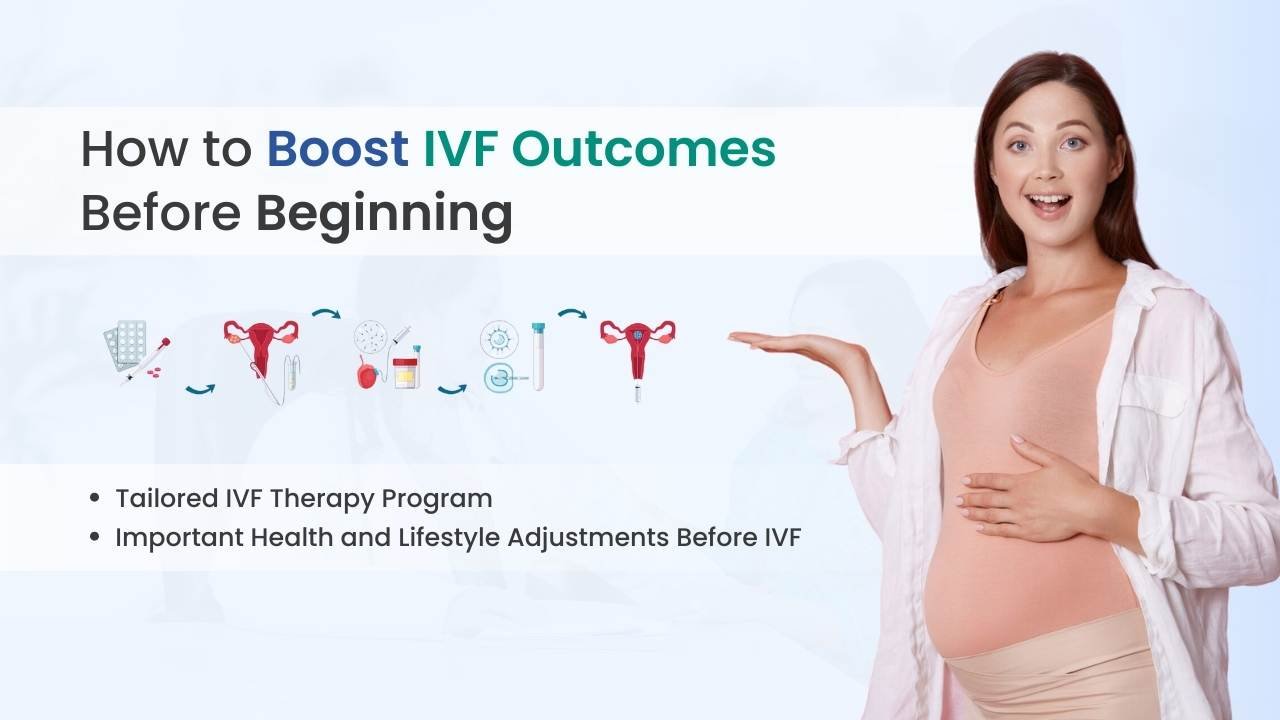Home Blogs Gynecology and Obstetrics How to make IVF successful the first time?

The success of the IVF process depends on preparation, lifestyle, and medical guidance. However, maintaining a healthy weight, a balanced diet, proper sleep, and stress management improves fertility. Yet, following a tailored treatment plan, avoiding harmful substances, and staying emotionally strong are important for the successful procedure. Communication with your fertility specialist and post-IVF care also play a key role in achieving success during the first cycle.
Maintaining a healthy weight, eating a balanced diet, exercising moderately, getting enough sleep, and managing stress are all ways to increase your chances of a successful initial IVF procedure, but many couples wonder how to make ICF successful the first time. And the answer lies in lifestyle and medical changes. Moreover, you should abstain from alcohol, tobacco, and recreational substances completely. To support the IVF procedure and maximize your health, you must take the prenatal vitamins that your doctor prescribes and adhere to their unique treatment plan.
IVF success can be influenced by various factors, which are important if you’re asking how to make IVF successful the first time. In vitro fertilization (IVF) is a reproductive technology that uses the mother's eggs and the father's sperm in a lab setting. To support the fetal growth and development until term, the doctor will implant the healthy embryo into the mother's uterus. The most successful assisted reproductive technology now on the market is in vitro fertilization, or IVF, which enables couples to fulfill their aspirations of starting a full family.

IVF success can be influenced by a variety of factors, including the lab's quality, the team's expertise, and the protocols observed.

You can increase your chances of successful IVF by being prepared. If you are searching for how to make IVF successful the first time, then preparing for it is important. Here are some tips for creating a solid foundation before the therapy begins.

Additional steps are necessary to make sure everything goes as well as possible once you're ready to begin IVF.
IVF is all about timing, so following the recommended procedure and paying close attention to your doctor's instructions are essential. This guarantees the efficient use of drugs and the timely occurrence of processes such as embryo transfer and egg retrieval.
The timing of these important actions will be guided by routine monitoring via blood tests and ultrasounds. You will be able to stay on course and make the required real-time modifications if you maintain continuous communication with your fertility team.
Additionally, the process can be less stressful if you are aware of the procedure and ready for every stage. Acquiring knowledge enables you to anticipate potential obstacles and make well-informed judgments.
In order to stimulate the ovaries to generate more eggs, hormone injections are used during this time. Because of the potential physical and emotional strain, stress management is crucial. Deep breathing techniques, yoga, and meditation can all help prevent anxiety.
The time frame preceding and following embryo transfer is also crucial. The body will be more receptive to the embryo if you remain composed and optimistic. Keep yourself surrounded by people who are encouraging, and don't be afraid to seek help from mental health specialists if necessary, because managing stress effectively is also an important part of how to make IVF successful the first time
You begin the "two-week wait" phase following the embryo transfer, which is a time of hope and expectation. Following some instructions can help your body work more efficiently.
Tips for Patients Having Their First IVF Cycle:
• Keep an optimistic attitude: Although feeling nervous is normal, make an effort to keep a positive outlook. Remain focused on the possibility of starting a new life while visualizing your objective. Throughout the treatment, thinking positively can affect both your physical and mental well-being.
• Be Flexible: Because the IVF process can be erratic, your treatment plan may need to be modified. Have faith and be adaptable in your medical staff. For optimal results, timing or drug adjustments may be required.
• Get Ready for Potential Results: It's critical to psychologically get ready for any scenario that could occur, including the potential failure of the first cycle. Dealing with disappointments can be made easier if you have a support system in place. Have a backup plan in place, such as talking to your expert about alternate therapies or upcoming cycles.
• Keep Lines of Communication Open: Continue to communicate with your fertility specialist. During treatment, talk about any worries or symptoms you may be experiencing. In order to resolve problems quickly and maintain the course of your therapy, clear communication is essential.
• Rest and Recuperate: Make sure you provide your body with the necessary rest following operations like as embryo transfer and egg retrieval. Regarding post-procedure care, heed your doctor's advice. Walking is a gentle activity that can increase blood flow without putting strain on the body.
• Maintain Proper Hydration and Nutrition: Adequate hydration and nutrition are essential. Make sure your diet is rich in whole grains, lean meats, fruits, and veggies. Your body will work better during therapy if you stay hydrated. Steer clear of processed foods and sugary snacks that might induce energy dumps and spikes.
FAQs
Factors like as age, fertility diagnosis, lifestyle, and clinic experience all affect IVF success rates. Women under the age of 35 often have greater success rates, ranging from 40 to 50 percent per cycle. Other important factors include the quality of the sperm and eggs, the condition of the uterus, and general wellness.
A key component of emotional readiness is creating a network of support, which may include your spouse, family, friends, or a therapist. Setting reasonable goals, engaging in stress-relieving activities like yoga and meditation, and joining support groups can all help you cope with emotional ups and downs.
A healthy lifestyle that includes a balanced diet, consistent exercise, enough sleep, abstaining from alcohol, tobacco, and excessive caffeine should be adopted by both partners. Optimal reproductive health also depends on controlling stress and keeping a healthy weight.
Women are typically advised to take prenatal vitamins that contain folic acid. Other vitamins, such as omega-3 fatty acids, vitamin D, and CoQ10, might be helpful, but before beginning any new supplement program, always get advice from your reproductive specialist.
Even while many people can keep working for most of the IVF process, schedule some time off, particularly around the days of egg harvesting and embryo transfer. For egg retrieval and perhaps embryo transfer, you might need to take one or two days off. If necessary, go over flexible work arrangements with your employer.
Abdominal pain, headaches, mood swings, and bloating are typical adverse effects. A less frequent but more significant adverse effect is Ovarian Hyperstimulation Syndrome (OHSS), which results in excruciating discomfort and bloating. Always let your doctor know about any strange or serious symptoms.
Keeping hydrated, eating small, frequent meals, and engaging in little exercise like walking can all help control discomfort. Before using over-the-counter pain relievers, speak with your doctor. Bloating can also be reduced by wearing loose clothing.
OHSS, many pregnancies, and issues with egg retrieval are among the risks. Keep lines of communication open with your medical team, adhere to your doctor's instructions, and attend all monitoring appointments in order to reduce these risks.

Written By
A hard working, patient centred, skillful and knowledgeable doctor who is always ready to learn.
From a very young age she aspired to be in the medical field, to help cure the ailing. She believes that relief on the patient's face, the smile of gratitude and the feeling of helping someone is all what matters.
SOURCE
HISTORY
At Mejocare, we prioritize accuracy and reliability. Our content is based on peer-reviewed studies, academic research, and medical associations. We avoid tertiary references. Learn more in our editorial policy. Trustworthy health information for you.
https://www.medparkhospital.com/en-US/lifestyles/tips-for-boosting-your-chance-of-ivf-success para 1 https://mamatafertility.com/blog/how-to-make-ivf-successful-the-first-time/ para 3
CURRENT VERSION
Our care team can help you.
